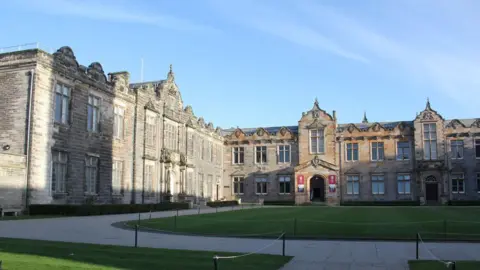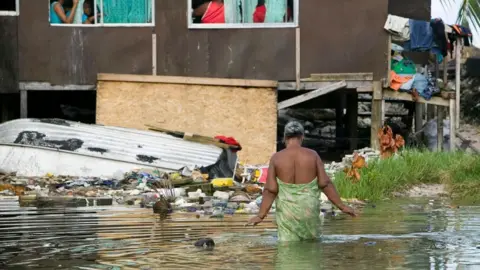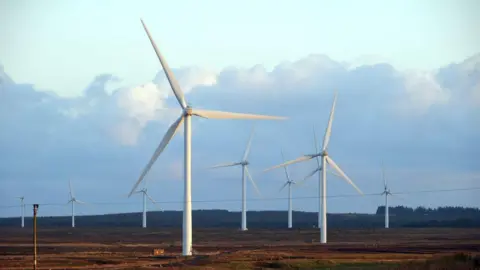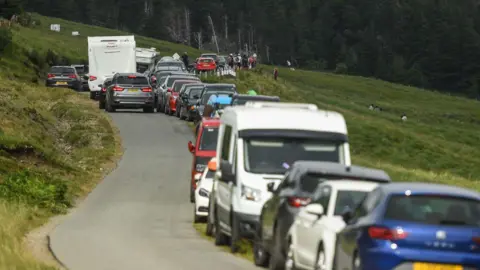Business/economy editor, Scotland
 BBC
BBCIt’s not obvious why islanders feel the urge to compete with each other. But they do.
The 20th Island Games being held in Orkney brings people together from the smaller isles around Britain and some distant seagirt lands, mostly with links to Britain or Denmark.
Why? What have they got in common? The Island Games Federation offers an answer.
“There’s just something about islanders,” its website declares.
“Growing up in small communities surrounded and shaped by the sea instils in us an independent spirit, a fierce pride in our culture and heritage — perhaps even a touch of stubbornness.
“It’s what gives Games competitors the will and determination to train hard, defy the odds and reach for gold”.
There’s certainly truth to the argument that they share cultures long protected by the sea from outside influences.
The word “insularity” – literally an island mindset – has been borrowed and distorted to describe a lack of interest in the world outside.
Yet many island stories are defined by the numbers who leave, taking their collective voice to centres of power and often remitting their earnings and investments back home.
The common heritage also has to do with looking to the oceans for a living from seafood, seafaring and tourism.
Among the Island Games competitors, they can also claim to be treated distantly by governments in London, Edinburgh and Copenhagen.

The history of art department at St Andrews University is leading a project to hear such island stories across oceans, mainly linking Scottish islands with the Caribbean.
Last year, it brought a group of young people from Barbados to the Isle of Harris.
According to Jamie Allan Brown, a St Andrews researcher, the focus was on passing down generations’ “traditional ecological knowledge, especially about local plants and wildlife, language and place names, and living off the land and sea”.
The University of the Highlands and Islands (UHI) has a master’s degree course in island studies, in which you can learn about the intertwined social, cultural, economic and environmental issues that concern Scottish islands.
It also draws comparisons with others in the Baltic, the Faroes and Canada’s Atlantic coast.
Around half of the independent members of the United Nations can be considered islands, including the UK and Ireland.
Some are classified as small and developing and they form a block of 39 nations within the UN, mostly in the Caribbean, Pacific and Indian Oceans.
So what do they have in common?
It may seem easier to see the differences – tropical to polar, volcanic or sandy, sovereign or dependent, valued or neglected, rich or poor, and with often complex interactions between the indigenous and the migrants.
But there are growing reasons for islanders to get together to celebrate a common bond of island-ness, and to combine forces in common causes.
Climate change
The voice of micro-nations has never been heard as loud as it is when they get together at the COP summits.
The forums gave prominence to national leaders from the Pacific and Caribbean, highlighting the risk islands face from rising sea levels and the increasing incidence of extreme storms.
Tuvalu, a sovereign nation that rises out the Pacific Ocean to a height of only five metres, is expected to be mainly under water at high tide within only 25 years.
 Getty Images
Getty ImagesLast month, for that reason, Australia began a ballot scheme to allow some of Tuvalu’s citizens to apply for permanent visas.
It was vastly over-subscribed as applications came in from more than a third of households.
The UN Human Rights Council (UNHRC) faces a challenge from the Marshall Islands (which has an average elevation of two metres) on Tuesday this week, calling on member countries to phase out the burning of oil.
It brings the prospect of a split from the usual consensus-building of that forum by oil producers in the Persian Gulf, signalling a formal retreat from COP commitments. The USA, under President Donald Trump, has pulled out of the Council.
But it’s not just low-lying island nations that face a threat from climate change. Hurricanes can lay waste a successful island economy within a few days.
In Hebridean islands, such as the Uists, storms can devastate sand dunes and machair, breach coastal defences and road links, and buckle wood-framed homes.
James Ellsmoor is founder and chief executive of Island Innovation, a consultancy that helps islanders learn from each other.
He says the Alliance of Small Island States (AOSIS) goes to COP gatherings with a “collective moral authority, to say they’re negligible as emitters, but on the front line as the most impacted”.
Renewable energy
Island Innovation has 16 employees, working with clients around the world.
It supports island authorities, often with limited resources to engage with multi-national organisations for funding or influence.
Once a year there’s a get-together, this autumn in Gran Canaria.
James Ellsmoor completed the degree course in island studies at UHI while working in renewable energy in the Caribbean.
He graduated at St Magnus Cathedral in Kirkwall and looks to UHI as a model for dispersed learning that could be important to many other island groups.
He says Scotland is also setting an example that’s being watched in Greece, South Korea and Italy for “island-proofing” legislation.
Although he had grown up on the English-Welsh border, his interest in island economies was sparked by the higher cost of power when he went to work in the Caribbean.
Power bills per unit can be up to five times higher than those in larger countries, usually due to the lack of scale when installing and running an oil-burning power station.

That’s changing, he points out.
The harnessing of wind, solar and tidal energy can make islands self-sufficient in power, and the falling cost of long sub-sea cables should make it possible for more exporting of power.
Scotland’s islanders know a lot about that, sharing a familiar tale around the world where islanders see wind turbines taking over their horizon but little of the benefit accruing to the island or islanders.
As Orcadians never tire of reminding us, they have the widest range of renewable power sources, including the EMEC marine technology testing centre, but still have higher power bills than other parts of Britain.
James Ellsmoor sees possibilities from island enterprises using their networks to build markets for island-specific answers to net zero questions.
He cites the Canadian province of Prince Edward Island, often overlooked across Canada’s vastness, but making waves with renewable and waste inventions that can be sold through strengthening links with Scottish and Canary islands as it builds up a portfolio of far-flung clients.
Among the issues they could consider together in future is the dependence on fossil fuels for shipping and air transport, which are vital links for people and goods coming and going out of islands.
Orkney offers a pioneering approach to electric inter-island flight.
Coming and going
One trend that islands have long experienced is of depopulation, as younger people leave, pushed by poverty or pulled by opportunity elsewhere.
Seen as an acute problem in the Western Isles of Scotland, those who remain on the islands tend to lack the range of age groups and skills to sustain public services.
South Korea is relatively new to this. Extended families on its islands are being broken up by out-migration and it is looking to other islands to learn lessons of supporting the economy and social structures around its shores.
Emigration has also been a dominant issue for Caribbean islands, bringing demographic problems back home, but also that large network of an island’s supporters and investors.
However aircraft and ships are not only taking people away. There are a lot of arrivals.
The growing problem for many islands is also one of their biggest opportunities – the global growth of tourism.
It thrives on one of the most valuable but intangible resources available to islands – that they appear to offer a destination that gets-away-from-it-all, often with pristine beaches, stunning coastlines and dramatic story-lines, fascinating cultures with rich histories.
While Shetland is becoming world-renowned for its TV murder mysteries, Orkney offers it all, and that history is opening up with new archaeological finds that show how important the islands were as a crossing point for sea trading routes long before roads were a reliable way of getting around.
Aruba offers a lot too. In the southern Caribbean, around 90% of its economy is in tourism.
When the pandemic hit, as an extreme example of such tropical islands within easy reach of North American and European markets, the vulnerability of the economy was laid bare.
Over-tourism concerns
Post-pandemic, tourism has bounced back. Majorca this year expects 100m tourism arrivals.
And it no longer takes a big marketing budget these days to promote how special a beach or coastal view can be. Instagram does that for free.
 Getty Images
Getty ImagesThe result can be seen on an island such as Skye, where tourism is tipping into concerns about over-tourism, driving some permanent residents to depart.
The solitude and pristine environment people want to experience is undermined by having to share it with so many others, also using narrow roads, also in camper vans.
AirBnB, along with other short term letting agencies, offers islanders the means to turn any old shed into a bijou and romantic escape.
Those used to be the places where young adult islanders would find homes while awaiting something more permanent and where seasonal workers stayed and sustained the summer tourist season. Not any more.
A common theme running through island economies is the lack of housing, though it depends on land ownership patterns and on affordability where incomes can be very low.
In Spain’s Balearic and Canary Islands, the effects of over-tourism, and particularly on housing costs, have become a hot political topic, with protest movements threatening to scare off the tourists on whom islanders continue to depend.
One answer is to get tourists to pay for the true economic cost of their visit, through charges and taxes.
Scotland’s councils are currently sizing up the cases for and against tourist taxes and charges for visiting cruise liners.
As James Ellsmoor points out, the international tourism businesses which own resorts and cruise liners are also powerful lobbyists against taxes and charges.
In the Caribbean, the threat of carving more government income out of tourism is met with a threat to take business to neighbouring islands.
Similar arguments are being made in Scotland.
New World Order
One of the gains of the post-1945 order is that tiny islands could assert their independence and sovereignty, including many breaking colonial bonds.
While that world order lasted, they had rights in international law and a champion in the United Nations.
In the era symbolised by Donald Trump, there’s a new world order, in which large superpowers are more interested in carving up spheres of influence and setting legal questions to one side in favour of their national interests.
That makes small islands vulnerable to the interests and whims of those superpowers.
A hundred years after the Treaty of Svalbard handed control of these Arctic islands to Norway, the prospect of mineral extraction in the region is a source of tensions with Russia.
China’s claim on Taiwan is the big threat to peace in East Asia, and small Pacific states such as Samoa, Tonga and Vanuatu have been drawn into China’s web of debt finance influence.
 Getty Images
Getty ImagesThe US President says he wants to take over Greenland. If that is even possible, it would be easy to do the same with smaller states in strategically helpful places.
International law can still protect islanders in some cases.
It was because Mauritus had won its legal claim over the Chagos islands in the Indian Ocean that the UK government felt it could not avoid a deal to relinquish ownership while still providing access to US forces on the strategically significant air base at Diego Garcia.
Britain continues to be a big player in shaping the role of the world’s islands – former colonies and continuing dependent territories – because it used to be exceptionally effective at taking over islands when its Royal Navy ruled the waves.
For some islands, the threat from larger countries, including the UK, is to crack down on tax evasion through low-tax havens, which happen to be island territories including the Isle of Man, Channel Islands and the Virgin and Cayman groups.
The islands around Scotland do not offer such tax benefits.
But after the sports competition is over in Orkney this week, they can offer further economic, environmental and social co-operation across the waters that define them.

